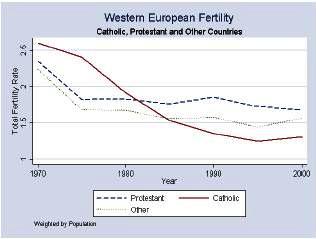 As you've no doubt read, the number of children per woman born in the majority Catholic southern European countries (Italy, Spain, Portugal) has plummeted in the last 35 years, going from being higher than the average TFR (total fertility ratio) in Europe to being significantly lower. (see graph)
As you've no doubt read, the number of children per woman born in the majority Catholic southern European countries (Italy, Spain, Portugal) has plummeted in the last 35 years, going from being higher than the average TFR (total fertility ratio) in Europe to being significantly lower. (see graph)Previous researchers have noted that there is a correlation between fertility decline and church attendance decline in strongly Catholic countries (though the fertility decline seems to lag behind religiosity decline by roughly fifteen years -- something which makes intuitive sense: it takes a while to get Catholicism out of your system of thought). The two European counties with declines in church attendance over 30% in the last fifty years (Spain and Italy) have fallen much farther in fertility than Ireland, where church attendance is still comparatively high. Nor, the authors say, can the fall in fertility be strictly a result of higher workforce participation by women, because although Spain and Italy have two of the lowest fertility rates in Europe, they also have two of the lowest female workforce participation rates.
Two reasons for the correlation between fertility and Catholic religiosity are cited by the paper:
- Catholic church attendance represents affirmation of a set of values that encourages child bearing.
- Active Catholic communities provide a number of child-rearing resources (in the form of schools, parish activities, parish friends, etc.) which reduce the difficulty of rearing large families.
The paper seeks to draw on both of these factors to explain the varying declines in fertility in different majority Catholic countries:
Our argument so far can be summarized as a series of conjectures:To measure cultural and social services as represented by the Catholic Church, the authors studied the correlation of the nuns per 10,000 Catholics metric to declining fertility, and found that there was a strong and direct correlation between the number of nuns available to staff Catholic social and cultural institutions and the number of children that Catholics had.
i) The Second Vatican Council caused a sharp decline in clergy per Catholic, though the timing
differed across countries;
ii) That decline reduced social services, spiritual and tangible, provided to Catholic communities;
iii) The reduction in services raised the shadow cost of raising children, reducing fertility;
iv) The reduction in services also caused a drop in religiosity, as measured by church attendance.
Conclusion of the paper is that it was the collapse of visible Catholic social institutions and ways of life (as priests and nuns streamed out of the Church and new vocations radically slowed), even more than decline in actively held beliefs, which caused the sudden drop in Catholic fertility after Vatican II.
It's an interesting line of reasoning, with some good data to support it. Those of us who have remained active in the faith since Vatican II have in many ways had to increase our emphasis on the learned faith (the doctrines and history of the Church) in addition to, or even instead of, the active Catholic lifestyle/culture which was so strong in the pre-Vatican II Church. From that perspective, it seems strange and rather silly to me when people talk about changes such as vernacular liturgy and the option of choosing a different Friday penance (rather than abstaining from meat) as major crises in faith. But it is perhaps impossible for me, as a post-Vatican II Catholic (even a very conservative one) to understand how directly many people identified things like Latin and meatless Fridays with the essence of being Catholic.






1 comment:
Not so sure I would agree with their conjectures. I have trouble believing that absense of Latin and meatless Fridays etc... is the ultimate cause here. If your faith is shaken so badly by a shake-up of the Liturgy (albeit a rather significant one) that you leave the Church, then it seems that VII only sped up the process to an eventual end.
I would contend that the cultural influences contributed to a general loss of religiosity over the generations.
I have a lot more to say on this, but I haven't the time. Work... grumble... grumble.
Post a Comment